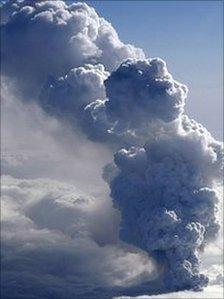'CO2 storage safe' say Edinburgh University scientists
- Published

Gas seeps naturally from the ground because of volcanic activity
Fears that storing carbon dioxide underground could pose a risk to human health are unfounded, a team of scientists has claimed.
Edinburgh University researchers said the risk of death from poisoning from exposure to CO2 leaks from underground rocks was about one in 100 million.
The team studied historical data on deaths from CO2 poisoning in Italy and Sicily.
There the gas seeps naturally from the ground because of volcanic activity.
The team, from the university's geosciences department, found the number of recorded deaths was very low, and said engineered gas storage underground could be even safer, as it would be planned and monitored.
Carbon capture and storage (CCS) enables collection of CO2 before it can escape into the atmosphere and contribute to global warming.
The procedure sees the gas collected at a power station or industrial site and liquefied before it is piped to the storage site, and injected deep below ground.
It is stored in microscopic rock pores and eventually dissolves in underground water.
Health concerns
Such technologies are expected to play an important role over the next 50 years, aiding in the development of clean energy.
However, recent CCS projects in northern Europe and Canada have been criticised by residents over health concerns arising from potential leakage.
Professor Stuart Haszeldine, who led the study, said: "Our findings show that storing CO2 underground is safe and should allay any concerns that the technology poses a significant threat to health."
The research was welcomed by environmental groups, but they warned against CCS technology being considered an alternative to other energy efficiency efforts.
Stan Blackley, chief executive of Friends of the Earth Scotland, said: "Carbon capture and storage technology could potentially help us to reduce carbon emissions, but at a relatively high cost.
"Its development must not be allowed to be a distraction from easier and cheaper electricity demand reduction and energy efficiency efforts, or from the development of low carbon, renewable energy developments.
"The technology of CCS is as yet unproven at any commercial scale.
"We are concerned that CCS will be used as an excuse by the energy industry to develop new fossil fuel-fired power stations.
"If CCS can be proven to work, it should only be used on an existing power station," he added.
- Published13 September 2011
- Published14 March 2011
- Published9 February 2011
- Published2 June 2010